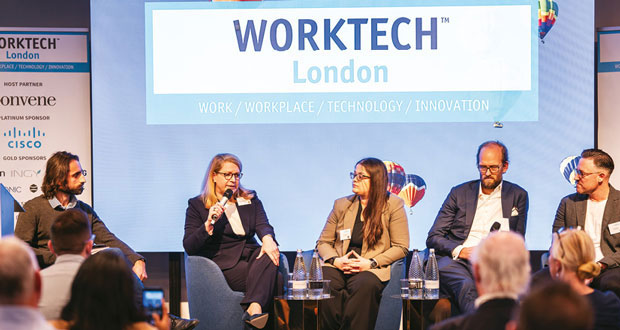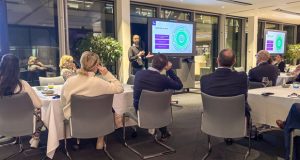Craig Peters, Senior Consultant, Magenta Associates reports from Day 1 of WorkTech London (November 21st – 22nd) which included discussions on the evolving needs of occupants and how digital technology is transforming the workplace
It felt quite apt that Edwin Heathcote, Architecture and Design Critic at the Financial Times, used his platform at WorkTech 2023 to reminisce back to the start of his career where “it was all about buildings that were shaped like spaceships”. Apt, not because he arrived in one. Although, let’s face it, after the past few years would anyone be surprised? No, apt because one of the underlying themes of WorkTech 2023 was of course artificial intelligence (AI) and the emerging trends in office design.
Interestingly, a passing comment by Heathcote on how the concept of the 15-minute city is being quashed by right-wing media and politicians didn’t get the attention that it perhaps deserved. Heathcote suggested that right of centre media isn’t completely behind the idea of 15-minute cities as “it’s an attack on cars, and you can’t attack their cars”.
With a growing focus on ESG, it is concerning that those at the top have described 15-minute cities as ‘a police on people’s lives’. The 15-minute city was first coined at COP27 in 2021. It suggests that instead of being perfected for cars, cities should be designed so that within the distance of a 15-minute walk or bike ride, people should be able to access work, housing, food, health, education, culture, and leisure.
PEOPLE AND AI
The concept of purpose versus profit when it comes to AI also proved to be a regular discussion point throughout the event. As we witness the evolution of technology, questions arise about the true intentions behind the development of AI.
“I can be replaced by a tape recorder,” remarked Daniel Hulme, CEO and Founder of Satalia. His compelling talk on day one of WorkTech reflected on the rapid advancements in AI. He highlighted the intriguing collaboration between OpenAI and Microsoft, or any other entity at the forefront of marketing campaigns.
“OpenAI has spurred the creation of numerous research labs,” he said. “These labs, however, aren’t driven solely by commercial output. Instead, their primary goal is to push the boundaries of understanding and building more sophisticated, intelligent machines. The focus, therefore, is on identifying and mitigating risks associated with AI development.”
Hulme emphasised the importance of clarity in purpose. Is the goal genuinely to enhance understanding and safety around intelligent machines, or does the pursuit of profit take precedence? The concern lies in the potential shift as companies grow, where the drive to make money could overshadow the initial purpose.
“The tension arises from this delicate balance” Hulme added. Is the commercial purpose aligned with the core values of advancing technology safely? It raises critical questions about governance structures. Hulme also suggested that structures akin to not-for-profit models or specific governance structures for genuine, non-commercial pursuits may be more appropriate. Hulme concluded with a clear unease about the potential conflict between the noble goal of advancing AI for the greater good and the commercial imperative that might threaten it.
EMPLOYEE’S EVOLVING NEEDS
The ’hotelification’ of the office to meet the evolving needs of employees was also dissected during a panel which featured Nicole Brocklebank-Fowler, Global Head of Property Portfolio, Clifford Chance; Jess Costanzo, Commercial Director, Simmtronic; Bastiaan de Groot, CEO, Ingy; and Dan Drogman, CEO, Smart Spaces.
Drogman emphasised the transformation of workplaces into more personalised and comfortable environments. He also highlighted the role of technology in facilitating this shift, comparing it to a hotel app that fosters two-way communication between employees and landlords. According to Drogman, this marks a significant shift as landlords adopt a more customer-focused approach akin to the hospitality industry, aiming to ensure the comfort and satisfaction of employees in the workplace. Quite ironically, 22 Bishopsgate – where the event was held – is monitored by thousands of Smart Spaces’ sensors.
During the conference, Nicole Brocklebank-Fowler, Global Head of Property Portfolio at Clifford Chance, echoed the sentiment that employees now harbour “much higher expectations” from their office spaces. She discussed the challenge of determining the elusive “secret sauce recipe” for each organisation and culture, something that continues to challenge businesses of all sizes and across different industry sectors. The discussion delved into the importance of providing a frictionless experience to entice employees back into the office, acknowledging the significant changes in work habits and the need to regain employee trust.
The panel, moderated by Arraz Makhani, Development Director at Unwork, explored the multifaceted responses of buildings and workplaces to the evolving needs of businesses and employees. As Jess Costanzo, Commercial Director at Simmtronic, noted: “the workforce’s increasing involvement in decision-making is leading to a demand for more personalised solutions.” This means that it is adding a layer of excitement to the evolving dynamics of office spaces. In this era of change, the conference continued to shed light on how technology, trust-building, and personalisation are all becoming integral aspects of the contemporary workplace experience.





